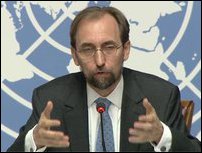 5TH LEAD (Adds video, OISL, OHCHR reports)
5TH LEAD (Adds video, OISL, OHCHR reports)
Genocide not recognised, ‘Hybrid mechanism’ recommended to drag on
[TamilNet, Wednesday, 16 September 2015, 11:21 GMT]
Not mentioning anything on genocide or future investigations on it, but projecting war crimes and crimes against humanity by both sides, the UN High Commissioner for Human Rights Zeid Ra'ad al Hussein, summing up the findings of the OISL report on Wednesday at the UNHCR, said that the recommendation is for a ‘Hybrid mechanism’. Mr Zeid openly admitted that ‘change’ in the political environment is the reason for OHCHR abandoning independent international investigation mechanism that had been recommended on many occasions by his predecessor Ms Navanetham Pillay. ‘Hybrid mechanism’ missing mandate for genocide investigation is the new way for buying ‘time and space’. If the universal process of justice could be dictated by local political changes, then there is no independency or universality in UN justice mechanism, commented Tamil activists for alternative politics in the island.
Following a note being passed to him from a person seated at his side, Mr Zeid also went on record, stating that his predecessor had on many occasions called for an independent international investigation, which the Human Rights Council finally mandated. “And, now that the political environment has changed and the government is committed to an accountability process, we believe that the next stage now is to bore into the details and establish this combined hybrid mechanism.”
“This [Hybrid] Court, if constituted, will advance the cause of victims in the years to come,” he added.
“We have also made a recommendation that the Government of Sri Lanka consider acceding to the Rome Statute of the International Criminal Court,” he said, hoping that there would be jurisdictional coverage in any crimes of these sort if continue to occur.
There have been commitments extended to create a new set of institutions on “truth telling” but this must be complemented by an accountability mechanism with the participation and support of the international community, Mr Zeid said.
For a question on why the OISL didn't recommend a referral to the ICC, he replied by repeating that he thought that the hybrid mechanism would deepen the ‘national involvement’ and at the same time ‘maintain international focus’ on Sri Lanka.
“The report recommends the establishment of a hybrid special court, integrating international judges, towards justice,” he said.
After the Office of the High Commissioner for Human Rights (OHCHR) investigation on Sri Lanka (OISL) conducted the investigations covering 9 years of period (2002 -2011), the current findings draws the OHCHR ever closer to the conclusions that are to be confirmed subsequently by a Court properly constituted, Zeid said.
The report has found that war crimes and crimes against humanity – violations that are among the most serious crimes of concern to the international community as a whole – have apparently been committed by State actors, and not just State actors, but by the LTTE and other paramilitary groups as well, he added.
The Court referred to by Prince Zeid is a not the ICC, but a hybrid special court.
The OISL report is divided into two parts, which are interlinked, an overarching report on promoting reconciliation (19 pages) and an accompanying detailed report (268 pages).
Unlawful killings, sexual and gender-based violence, enforced disappearances, torture and other forms of cruel or degrading treatment, recruitment of children and their use in hostilities, attacks on civilians and civilian objects, denial of humanitarian assistance and violations during the detention of internally displaced people are the most serious crimes documented in the report, a statement by the OHCHR said.
The OHCHR which is caring at length, to the extent of even retracting from its earlier outlook, in recognising the simulated ‘political change’ of the State in Colombo that is consistently proven for its failures in investigations, doesn't want to recognise the political voice unanimously resolved either in the Northern Provincial Council (NPC) or in the Tamil Nadu State Assembly, the activists pointed out.
This shows that the United Nations practically functions as a trade union of States, the activists added.
The ‘sum up’ of the OHCHR ultimately aims at suppression of seeing the national question of Eezham Tamils as national question, for preserving the integrity of the genocidal State in the island at any cost, in order to allow time and space for the ‘engineering mechanisms’ of competing imperialisms to operate, commented the Tamil activists.
Chronology:









